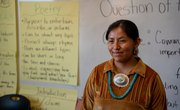An educational tour offers students of all ages an opportunity for a rich immersion experience. While an educational tour is great fun, it differs from a vacation. Typically led by a teacher and group chaperones, such trips provide invaluable global learning. On an educational school trip students experience culture firsthand. Students come to appreciate parts of the world on a much deeper level than they ever could in the classroom. Students converse and socialize with local people, which broadens their perspective greatly.
Talking With Locals
Through talking with individuals, students will learn that people of any culture have many different views, values and world perspectives. Talking with locals will also give them a greater empathy for people of that culture, helping them to identify more with people from different places and backgrounds. As the website Travel Etiquette illustrates, you should familiarize yourself and your class with local customs before traveling to a foreign country. Know how to greet someone appropriately, what is acceptable to talk about, and other aspects of social interaction.
Cultural Observation
On a good educational tour, students experience a different culture through new eyes. Many tours are now offering volunteering opportunities and other chances to see how people of varying socioeconomic levels in a variety of locales live. Such experiences can help students develop more compassion for people from different walks of life. It can also help them to reflect on how these issues affect people near their home, inspiring them to work toward change.
If you're planning an educational tour, consider the many economic, social, educational and other issues affecting people, animals, and the environment in your destination. Decide how you can help your students understand these issues through completely immersing themselves in the experience. You may want to provide reading assignments ahead of time to give your class an idea of what to expect in their new environment.
Connecting Different Issues
Students embedded in a different culture and in a new place for the first time can begin drawing connections between the different issues they've been learning about regarding that culture. They can begin to learn, in a more concrete way, how environmental, socioeconomic, political and other issues are all interrelated. You can facilitate this learning by having regular group discussions throughout your educational school trip in which everyone reflects on their experiences and impressions.
Before leaving you might also want to assign students the requirement to keep a daily journal so they'll be prepared to participate in group reflection, and also retain what they have learned for years to come. Remind students to take interesting photographs, not just selfies.
Instilling a Passion for Travel
An educational tour can be a "safe" way to experience the world outside of one's home. On the tour, students are surrounded by other people they know, and they're guided throughout the experience by their teacher and other guides. Plus, they often pay much less than they would if they went by themselves.
When students realize how much they enjoy traveling, it can open new doors for them. They might decide to study abroad to more thoroughly immerse themselves in different cultures. They may also be more likely to travel independently in the future, continuing to broaden their understanding of the world. Some students might even realize their passion for learning about other cultures, and turn it into a career.
Importance of Excursion for Students
Through their experiences in a different culture, students will learn to see their homeland in a new way. Once they learn to think about the issues affecting another country in a holistic way, they can begin to do the same with their own country, state and city. This can be one of the most beneficial aspects of an educational tour.
Related Articles
References
Writer Bio
Melanie J. Martin specializes in environmental issues and sustainable living. Her work has appeared in venues such as the Environmental News Network, "Ocean" magazine and "GREEN Retailer." Martin holds a Master of Arts in English.











